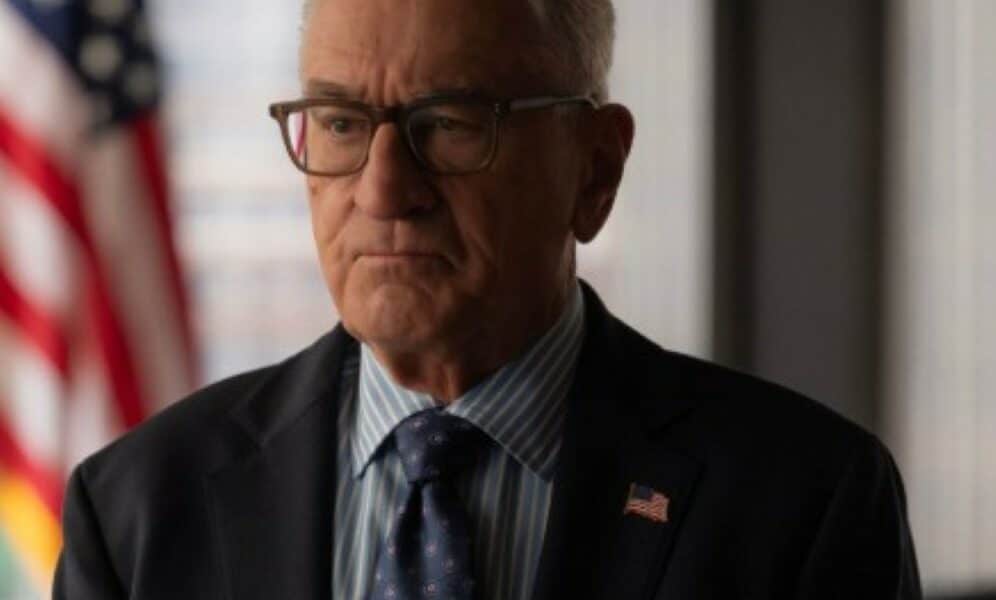The miniseries Zero Day, starring Robert De Niro, has become one of Netflix’s biggest hits since its premiere on February 20, 2025. The show presents a political thriller and conspiracy story centered around an unprecedented cyberattack that paralyzes the United States for one minute, causing large-scale accidents and fatalities. De Niro plays George Mullen, a former U.S. president who is called upon by the current leader, Evelyn Mitchell, played by Angela Bassett, to investigate the attack and prevent further threats. The plot delves into political instability and the influence of major technology corporations, as Mullen uncovers conspiracies involving powerful figures in the government, economy, and media.
The cast includes renowned actors such as Jesse Plemons, Lizzy Caplan, Connie Britton, Joan Allen, and Matthew Modine. Created by Eric Newman, Noah Oppenheim, and Michael S. Schmidt, the series explores contemporary themes like digital security, information manipulation, and the impact of government decisions on democracy. The show is directed by Lesli Linka Glatter, known for her work on Homeland, adding a technical and detailed perspective to the political thriller.
This will happen again.
Zero Day — a new limited series starring Robert De Niro and Angela Bassett — is now playing! pic.twitter.com/n5XmNcvTho
— Netflix (@netflix) February 20, 2025
Since its release, Zero Day has sparked discussions about the growing threat of cyberattacks and their consequences on the geopolitical landscape. Experts point out that the story draws parallels to real-world situations, such as the increasing vulnerability of digital infrastructure and the role of big tech companies in shaping public opinion. The series’ realism has boosted its popularity, making it one of the most talked-about productions of the year.
The plot and its developments
The cyberattack that sets the story in motion happens unexpectedly, disrupting critical systems nationwide for 60 seconds, including power grids, communication networks, and emergency services. This instant collapse triggers a devastating domino effect, causing traffic disasters, plane crashes, and hospital failures that result in thousands of deaths. Faced with the crisis, President Evelyn Mitchell establishes the Zero Day Commission, granting Mullen authority to lead an independent investigation into the attack’s perpetrators.
As the story unfolds, Mullen discovers that the attack may be linked to a network of interests involving foreign governments, tech companies, and high-ranking officials within the U.S. government. His character faces challenges not only in identifying those responsible but also in handling mounting media pressure and congressional scrutiny.
The script employs intense psychological tension, placing characters in high-stakes situations filled with mutual distrust. With sharp dialogue and unexpected twists, Zero Day keeps the audience engaged while raising questions about national security and the impact of technology on political power.
Robert De Niro’s television debut
Zero Day marks Robert De Niro’s first time leading a TV series after decades of a legendary film career. The actor, known for classics like The Godfather Part II and Taxi Driver, surprised fans by taking on the challenge of starring in a political thriller in a new narrative format. His performance as George Mullen has been praised by critics and viewers, solidifying his versatility as an actor.
Angela Bassett, who plays President Evelyn Mitchell, also stands out in the cast. Her character faces both political and personal dilemmas as she struggles to maintain national stability after the attack. Lizzy Caplan plays Alexandra Mullen, the former president’s influential congresswoman daughter, whose complicated relationship with her father adds an emotional layer to the story.
Jesse Plemons plays Roger Carlson, a former Mullen aide who resurfaces during the crisis, carrying secrets that could change the course of the investigation. Other key characters include Connie Britton as an influential investigative journalist and Matthew Modine as a tech mogul with hidden agendas.
Themes explored in the series
- Cyberattacks: The show examines how the digitization of national infrastructure can make societies vulnerable to cyber invasions, causing catastrophic impacts.
- Information manipulation: The plot highlights the role of misinformation and conspiracy theories in shaping public perception, a highly relevant issue in the digital era.
- Big Tech’s political interference: Zero Day raises concerns about the power of technology companies in geopolitics and their control over global communication.
- Ethical conflicts in government: The story questions how far political leaders should go to ensure national security and whether there are limits to using technology in government investigations.
Facts and data on real-world cyberattacks
- In 2020, cyberattacks increased by 600% due to the rise in remote work and digital dependency.
- Cybercrime is projected to cause over $10.5 trillion in annual damages by 2025.
- Major cyberattacks have crippled entire nations, such as the NotPetya virus, which initially targeted Ukraine but spread globally.
- Governments worldwide have been victims of cyber invasions, including the U.S., which suffered an attack on the Colonial Pipeline in 2021, disrupting fuel supply on the East Coast.
Impact and reception of the series
Zero Day quickly became one of the most-watched Netflix titles, reaching millions of viewers within its first days. The production has been compared to other successful political thrillers, such as House of Cards and Homeland, for its realistic approach and engaging narrative.
Critics have praised De Niro and Angela Bassett’s performances, as well as the show’s ability to reflect contemporary concerns. However, some reviews argue that the series overuses dramatic twists and leaves certain plot points unresolved.
Despite these critiques, Zero Day has fueled intense discussions about digital infrastructure vulnerabilities and the future of cybersecurity. Its impact extends beyond entertainment, prompting audiences to reflect on the fragility of the systems that sustain modern society.

The miniseries Zero Day, starring Robert De Niro, has become one of Netflix’s biggest hits since its premiere on February 20, 2025. The show presents a political thriller and conspiracy story centered around an unprecedented cyberattack that paralyzes the United States for one minute, causing large-scale accidents and fatalities. De Niro plays George Mullen, a former U.S. president who is called upon by the current leader, Evelyn Mitchell, played by Angela Bassett, to investigate the attack and prevent further threats. The plot delves into political instability and the influence of major technology corporations, as Mullen uncovers conspiracies involving powerful figures in the government, economy, and media.
The cast includes renowned actors such as Jesse Plemons, Lizzy Caplan, Connie Britton, Joan Allen, and Matthew Modine. Created by Eric Newman, Noah Oppenheim, and Michael S. Schmidt, the series explores contemporary themes like digital security, information manipulation, and the impact of government decisions on democracy. The show is directed by Lesli Linka Glatter, known for her work on Homeland, adding a technical and detailed perspective to the political thriller.
This will happen again.
Zero Day — a new limited series starring Robert De Niro and Angela Bassett — is now playing! pic.twitter.com/n5XmNcvTho
— Netflix (@netflix) February 20, 2025
Since its release, Zero Day has sparked discussions about the growing threat of cyberattacks and their consequences on the geopolitical landscape. Experts point out that the story draws parallels to real-world situations, such as the increasing vulnerability of digital infrastructure and the role of big tech companies in shaping public opinion. The series’ realism has boosted its popularity, making it one of the most talked-about productions of the year.
The plot and its developments
The cyberattack that sets the story in motion happens unexpectedly, disrupting critical systems nationwide for 60 seconds, including power grids, communication networks, and emergency services. This instant collapse triggers a devastating domino effect, causing traffic disasters, plane crashes, and hospital failures that result in thousands of deaths. Faced with the crisis, President Evelyn Mitchell establishes the Zero Day Commission, granting Mullen authority to lead an independent investigation into the attack’s perpetrators.
As the story unfolds, Mullen discovers that the attack may be linked to a network of interests involving foreign governments, tech companies, and high-ranking officials within the U.S. government. His character faces challenges not only in identifying those responsible but also in handling mounting media pressure and congressional scrutiny.
The script employs intense psychological tension, placing characters in high-stakes situations filled with mutual distrust. With sharp dialogue and unexpected twists, Zero Day keeps the audience engaged while raising questions about national security and the impact of technology on political power.
Robert De Niro’s television debut
Zero Day marks Robert De Niro’s first time leading a TV series after decades of a legendary film career. The actor, known for classics like The Godfather Part II and Taxi Driver, surprised fans by taking on the challenge of starring in a political thriller in a new narrative format. His performance as George Mullen has been praised by critics and viewers, solidifying his versatility as an actor.
Angela Bassett, who plays President Evelyn Mitchell, also stands out in the cast. Her character faces both political and personal dilemmas as she struggles to maintain national stability after the attack. Lizzy Caplan plays Alexandra Mullen, the former president’s influential congresswoman daughter, whose complicated relationship with her father adds an emotional layer to the story.
Jesse Plemons plays Roger Carlson, a former Mullen aide who resurfaces during the crisis, carrying secrets that could change the course of the investigation. Other key characters include Connie Britton as an influential investigative journalist and Matthew Modine as a tech mogul with hidden agendas.
Themes explored in the series
- Cyberattacks: The show examines how the digitization of national infrastructure can make societies vulnerable to cyber invasions, causing catastrophic impacts.
- Information manipulation: The plot highlights the role of misinformation and conspiracy theories in shaping public perception, a highly relevant issue in the digital era.
- Big Tech’s political interference: Zero Day raises concerns about the power of technology companies in geopolitics and their control over global communication.
- Ethical conflicts in government: The story questions how far political leaders should go to ensure national security and whether there are limits to using technology in government investigations.
Facts and data on real-world cyberattacks
- In 2020, cyberattacks increased by 600% due to the rise in remote work and digital dependency.
- Cybercrime is projected to cause over $10.5 trillion in annual damages by 2025.
- Major cyberattacks have crippled entire nations, such as the NotPetya virus, which initially targeted Ukraine but spread globally.
- Governments worldwide have been victims of cyber invasions, including the U.S., which suffered an attack on the Colonial Pipeline in 2021, disrupting fuel supply on the East Coast.
Impact and reception of the series
Zero Day quickly became one of the most-watched Netflix titles, reaching millions of viewers within its first days. The production has been compared to other successful political thrillers, such as House of Cards and Homeland, for its realistic approach and engaging narrative.
Critics have praised De Niro and Angela Bassett’s performances, as well as the show’s ability to reflect contemporary concerns. However, some reviews argue that the series overuses dramatic twists and leaves certain plot points unresolved.
Despite these critiques, Zero Day has fueled intense discussions about digital infrastructure vulnerabilities and the future of cybersecurity. Its impact extends beyond entertainment, prompting audiences to reflect on the fragility of the systems that sustain modern society.







